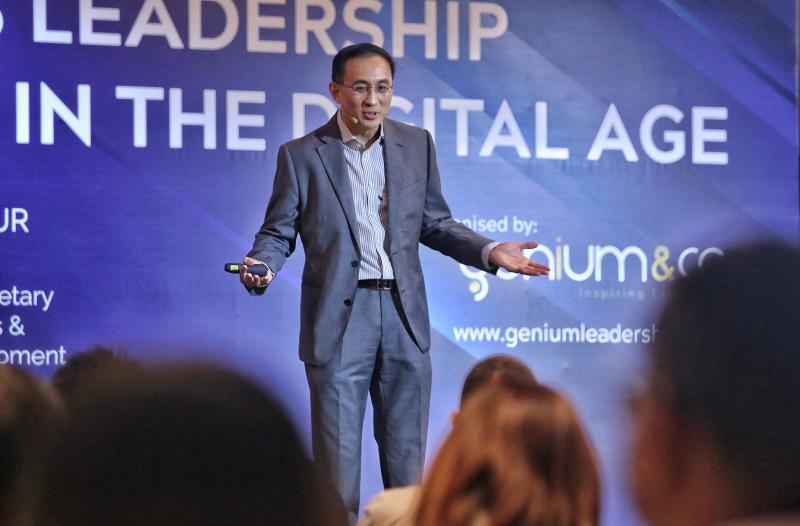Desmond Kuek shares leadership lessons from his time in heading SMRT and SAF
Sign up now: Get ST's newsletters delivered to your inbox

"Putting people first" was among the lessons Mr Desmond Kuek learnt from his days at SMRT, where he was chief executive from 2012 to 2018.
PHOTO: LIANHE ZAOBAO
SINGAPORE - Amid the massive train disruption that affected more than 250,000 commuters on July 7, 2015, then-SMRT chief executive Desmond Kuek had to make a call: should he shut down the North-South and East-West lines?
Despite the potential damage to the rail operator's reputation, he chose to do so as he felt that commuter safety should come above all else, said Mr Kuek, as he pointed out that none of the commuters who de-trained during the evening peak hours were hurt.
"Putting people first" was among the lessons Mr Kuek learnt from his days at SMRT, where he was chief executive from 2012 to last year.
He was speaking to private and public sector leaders at a symposium organised by the leadership consultancy that he co-founded with two former SAF colleagues on Monday (July 22).
"Nobody wishes for crisis. But in today's disruptive world, it must surely be anticipated and prepared for, since it is not a question of if but when," said Mr Kuek, who joined Swiss investment bank UBS as divisional vice-chairman for global wealth management in February.
The former Chief of Defence Force from 2007 to 2010 also said that new threats in the early 2000s set the Singapore Armed Forces (SAF) thinking about what it needed to do to cope with disruptive change.
The severe acute respiratory syndrome (Sars) crisis hit Singapore in 2003, and transnational terrorism was a growing threat after the September 11 attacks in the United States.
Such factors, together with new technologies and a declining birth rate, set the right conditions for the SAF to bring about organisational transformation and adopt new capabilities that helped it become the third-generation, networked and integrated armed forces that it is today, Mr Kuek said.
The one-day event at the Pan Pacific hotel, on the topic Crisis Leadership in the Digital Age, was the first public event organised by leadership consultancy Genium & Co, where Mr Kuek, 55, is chairman.
He set up Genium last year with retired SAF officers - Mr Fred Tan, 49, and Mr Ang Yau Choon, 52 - who are both managing directors at the consultancy.
Mr Tan was head of the Singapore Armed Forces' Centre for Leadership Development, while Mr Ang had served as commander of the Commando Training Institute. They were both colonels.
Other speakers on Monday included Cyber Security Agency chief executive David Koh, Harvard professor Eric McNulty, managing partner of strategic communications consultancy Kreab Ng Wei Joo, and current affairs editor at Rice Media Grace Yeoh.
In her keynote address, Senior Parliamentary Secretary for Home Affairs and National Development Sun Xueling said digital platforms can be enablers and amplifiers of crises, such as in helping to spread falsehoods. But they can also be used to manage crises as part of a communications strategy.
"As leaders, we know all too well the need to be upfront with the public, with stakeholders when a crisis occurs… A lack of information can lead to panic, disorder and continued danger if the public does not know what to do or what to expect," she said.
She said that for the Home Affairs ministry, digital technologies help leaders to make sense of the situation on the ground, such as through gathering information on suspicious sightings from members of the public using the SGSecure app.
They can also use the i-Witness function within the Police @ SG mobile app to provide information about criminal activities to the police.


